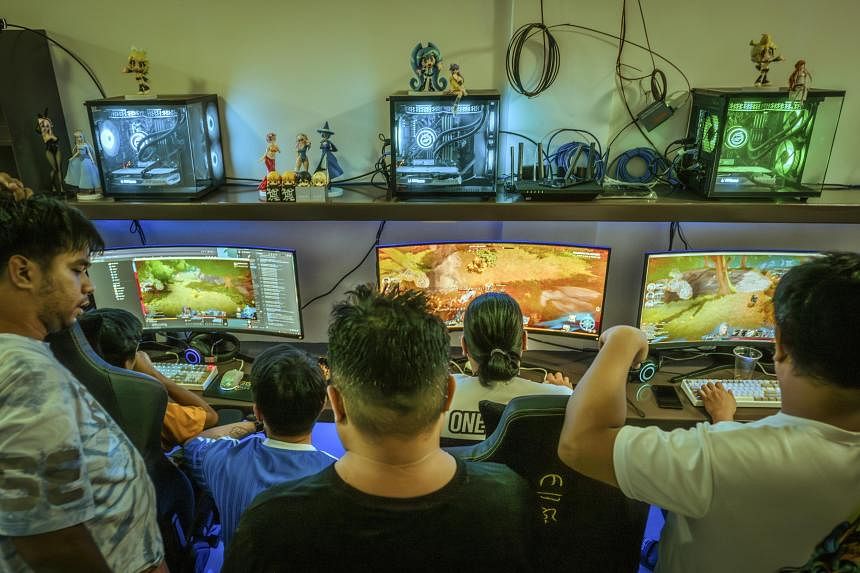QUEZON CITY, Philippines – On a recent night, about 20 people crowded onto the second floor of Mr Joniel Bon’s newly opened Internet cafe in Quezon City, 16km from Manila.
Seated at computers with 34-inch curved monitors, they began playing video games such as Heroes Of Mavia and Nifty Island, as music from Taylor Swift and Maroon 5 hummed from the speakers.
Playing these games can be a full-time job, and some of Mr Bon’s customers had settled in for the night with slices of pizza to fuel them.
The games reward players with cryptocurrency tokens for completing small, daily challenges.
Often, players convert their tokens to pesos, the country’s currency, earning about twice the Philippines’ minimum wage of US$11 (S$15) a day.
Mr Bon, 40, had dreamed about the buzz of activity at his own business after cryptocurrencies crashed spectacularly two years ago, dashing his hopes for a thriving game collective at the time.
“There was a point I had to say, ‘I believe in this’. I had to hope,” said Mr Bon, a former information technology worker. “We survived.”
Mr Bon’s new Internet cafe is a sign of how crypto has begun booming again in the Philippines, which has long been a centre of crypto activity.
In March, Bitcoin reached a record high of US$72,968, capping a comeback from the 2022 market meltdown and bringing other digital currencies such as Ether along with it.
New billboards for crypto companies have now popped up around Manila.
People have started harvesting virtual crops from a crypto farming game called Pixels as a fresh source of income.
Overseas Filipino workers, known as OFWs, are also returning to the country to earn crypto as metaverse Filipino workers, or MFWs.
In November and December, the value of crypto transactions in the Philippines increased 70 per cent from September and October, to US$7.3 billion, according to data from the research firm Chainalysis.
The Philippine player base for Pixels spiked to more than 830,000 in March from 80,000 players in November, according to the game’s developers.
About 30 per cent of the world’s crypto-earning video gamers are based in the Philippines, they said.
The renewed activity has given some Philippine officials pause.
At a crypto conference in Manila in November, Mr Kelvin Lee, then a commissioner at the country’s Securities and Exchange Commission, said the government was wrestling with how to regulate the technology as it regained popularity.
Cryptocurrencies have been at the centre of frauds and scams in the past. The tokens that crypto-earning games dole out are more volatile than Bitcoin and Ether, meaning the boom could go bust again.
“We want a safe space to operate well,” Mr Lee said, while acknowledging that a robust crypto industry could help the Philippines, which relies heavily on outsourced customer service and IT jobs. “How can you operate well if the industry itself, if the space itself, looks unruly, unwieldy, illegal?”
Mr Lee, who left the commission in early March, declined an interview request. In February, the Philippines’ central bank told local media that it planned to release its own digital currency in the next two years.
Crypto became especially popular in the Philippines during the pandemic lockdowns. While more than 40 per cent of the country’s population does not have a bank account, the majority of Filipino households have Internet access, which has allowed crypto to spread to rural areas.
At the time of the lockdowns, people began playing the crypto-earning video game Axie Infinity, made by a Vietnamese company, Sky Mavis.
In the game, players battle Pokemon-like characters to earn a cryptocurrency called Smooth Love Potion.
At the peak of Axie’s popularity in 2021, Smooth Love Potion was accepted by landlords, petrol stations and some restaurants in the Philippines as an alternative to pesos.
But when crypto collapsed a year later, thousands of Filipinos lost the savings they held in Smooth Love Potion.
The game’s characters – which some players would trade to sell for thousands of dollars, so valuable that some Filipinos took out loans to buy them – became worthless.
“The game worked well when everyone was getting in,” said Mr Ian Dela Cruz, 30, a farmer in Pampanga, a province north of Manila, and a former Axie player. “But when everyone tried to get out, that’s when it stopped.”
Some Filipinos who successfully earned money through Axie became entrepreneurs, building their own companies and gaming collectives called “guilds”. Now, some of those efforts are taking off.
Ms Teresa Pia, 27, a former Axie player, left her job as a pre-school teacher in 2021 to run a crypto gaming guild called Real Deal, which has 54,000 members on the social media platform Discord.
Ms Pia said she saw her Discord channel “as a new classroom” where she taught members, many of them Filipino women who work overseas, to trade and invest in crypto.
As crypto recovers, many of those women are now earning enough money to return home to their families, she said.
“The amount of money that they receive, it may seem small, but when you convert to pesos, it’s big for them,” Ms Pia said.
This article was originally published by a www.straitstimes.com . Read the Original article here. .

